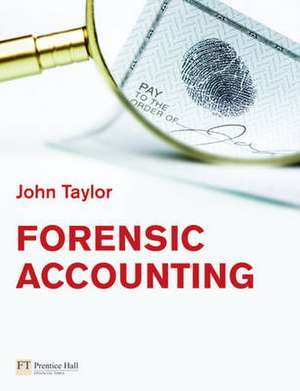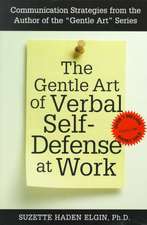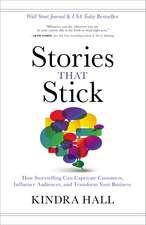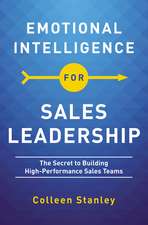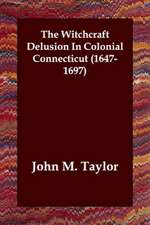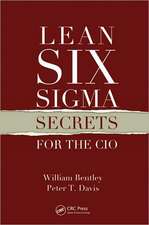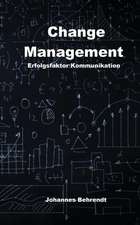Forensic Accounting
Autor John Tayloren Limba Engleză Paperback – 11 noi 2010
Preț: 519.50 lei
Preț vechi: 597.12 lei
-13% Nou
Puncte Express: 779
Preț estimativ în valută:
99.42€ • 107.95$ • 83.51£
99.42€ • 107.95$ • 83.51£
Carte disponibilă
Livrare economică 01-15 aprilie
Livrare express 18-22 martie pentru 46.36 lei
Preluare comenzi: 021 569.72.76
Specificații
ISBN-13: 9780273722960
ISBN-10: 0273722964
Pagini: 504
Ilustrații: Illustrations
Dimensiuni: 187 x 246 x 27 mm
Greutate: 0.95 kg
Ediția:1
Editura: Pearson Education
Locul publicării:Harlow, United Kingdom
ISBN-10: 0273722964
Pagini: 504
Ilustrații: Illustrations
Dimensiuni: 187 x 246 x 27 mm
Greutate: 0.95 kg
Ediția:1
Editura: Pearson Education
Locul publicării:Harlow, United Kingdom
Cuprins
PART 1: Corporate Governance, The Role of the Auditors and the Legal Context
Chapter 1: The Development of Corporate Governance
Chapter 2: The Role of the Auditors
Chapter 3: The Legal Context
PART 2: The role of the organisation and the Psychology of Fraud
Chapter 4: The Role of the Organisation
Chapter 5: The Pyschology of Fraud
Part 3: Fraud Risk Management
Chapter 6: Defining and identifying fraud
Chapter 7: Fraud Risk Management
Chapter 8: Internal Control
Chapter 9: Risk Management and IT systems
Part 4: Carrying out a fraud investigation
Chapter 10: The approach to investigation
Chapter 11: Investigating frauds against the organisation
Chapter 12: Management Fraud
Chapter 13: The use of IT in fraud investigation
Part 5: Non Fraud Work
Chapter 14: Valuation of business and marital assets
Chapter 15: Claims
Chapter 16: The forensic accountant as expert witness
Chapter 1: The Development of Corporate Governance
Chapter 2: The Role of the Auditors
Chapter 3: The Legal Context
PART 2: The role of the organisation and the Psychology of Fraud
Chapter 4: The Role of the Organisation
Chapter 5: The Pyschology of Fraud
Part 3: Fraud Risk Management
Chapter 6: Defining and identifying fraud
Chapter 7: Fraud Risk Management
Chapter 8: Internal Control
Chapter 9: Risk Management and IT systems
Part 4: Carrying out a fraud investigation
Chapter 10: The approach to investigation
Chapter 11: Investigating frauds against the organisation
Chapter 12: Management Fraud
Chapter 13: The use of IT in fraud investigation
Part 5: Non Fraud Work
Chapter 14: Valuation of business and marital assets
Chapter 15: Claims
Chapter 16: The forensic accountant as expert witness
Notă biografică
John Taylor is a senior lecturer in Accounting and Auditing at Leeds Metropolitan University but prior to that spent many years as a professional accountant in the audit profession and as the financial director of a company in the clothing industry.
Textul de pe ultima copertă
The only textbook on forensic accounting specifically written to cover UK business practice, this accessible and comprehensive introduction uses stories of real-world frauds and practical case studies to help develop your skills.
Forensic Accountingoffers a detailed explanation of the process for defending against and investigating fraud within the UK, considering the legal and corporate governance framework in which fraudsters operate and the psychology of their behaviour. The text also covers non-fraud aspects of a forensic accountant's work, such as litigation support, dispute resolution, quantifying damages or compensation claims and acting as an expert witness.
Features
· Wholly focused on the legal and regulatory systems and rules in place within the UK.
· Incorporates end of chapter case studies which can be used to practise forensic accounting skills.
· Emphasises the power of computer-based investigation through the use of data mining and data analysis.
· Considers how organisational culture influences corrupt behaviour and the action of individual fraudsters.
Forensic Accounting is the ideal course text for accountancy and auditing students studying forensic accounting, and also provides an accessible introduction for legal and accountancy practitioners.
John Taylor is a Senior Lecturer in accounting and auditing at Leeds Metropolitan University. He has substantial experience of working as an accountant in the audit profession and was formerly financial director of a company in the clothing industry.
Forensic Accountingoffers a detailed explanation of the process for defending against and investigating fraud within the UK, considering the legal and corporate governance framework in which fraudsters operate and the psychology of their behaviour. The text also covers non-fraud aspects of a forensic accountant's work, such as litigation support, dispute resolution, quantifying damages or compensation claims and acting as an expert witness.
Features
· Wholly focused on the legal and regulatory systems and rules in place within the UK.
· Incorporates end of chapter case studies which can be used to practise forensic accounting skills.
· Emphasises the power of computer-based investigation through the use of data mining and data analysis.
· Considers how organisational culture influences corrupt behaviour and the action of individual fraudsters.
Forensic Accounting is the ideal course text for accountancy and auditing students studying forensic accounting, and also provides an accessible introduction for legal and accountancy practitioners.
John Taylor is a Senior Lecturer in accounting and auditing at Leeds Metropolitan University. He has substantial experience of working as an accountant in the audit profession and was formerly financial director of a company in the clothing industry.
Caracteristici
Forensic Accounting provides:
· Fraud risk management and building defences against fraud
· Frauds against the organisation, management fraud, bribery and corruption
· Fraud risk management and building defensive systems, including the use of IT
· The process of carrying out a fraud investigation including the use of computer based techniques
· Valuation of businesses and matrimonial disputes
· Asset tracing and litigation support
· Compensation and damages claims
· The forensic accountant as expert witness
- Illustrations and examples of a range of real life frauds, all of which took place in the UK.
- The framework – Corporate Governance ,the role of auditors and the legal framework
· Fraud risk management and building defences against fraud
· Frauds against the organisation, management fraud, bribery and corruption
· Fraud risk management and building defensive systems, including the use of IT
· The process of carrying out a fraud investigation including the use of computer based techniques
· Valuation of businesses and matrimonial disputes
· Asset tracing and litigation support
· Compensation and damages claims
· The forensic accountant as expert witness
